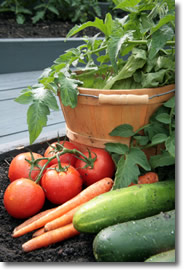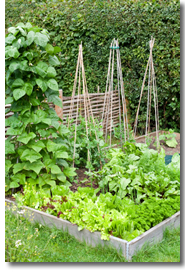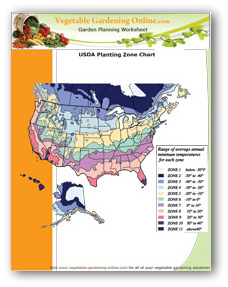
Easy tips for organic vegetable gardening at home. Learn how to plant and care for an organic garden on your patio, or in your backyard.
Organic vegetable gardening is considered an art-form by many horticulturalists. Other gardeners "just do it" organically without really becoming fanatics.
What is Organic Gardening?
Organic gardening is defined basically as the culture and growing of garden variety plants without resorting to chemical additives.Organic gardening has made a big comeback in the last decade due to concerns about the health risks of processed foods and synthetic fertilizers or pesticides.
In short, there’s really no substitute for the old-school way of doing things.
But to describe it more simply, organic gardening doesn’t depend on various chemicals to help the plants grow. It is basically the opposite of high-tech agriculture.
It is quite simple to plan and grow an organic vegetable garden at home.
Planning an Organic Garden
The first thing you need to do to prepare your organic vegetable garden is to choose a location where plenty of sunlight is available.
Also, make sure that the location you choose has well-drained soil, and is free of nearby tree roots which will compete with your garden plants for water.
When it comes to gardening, especially organic vegetable gardening, prepare planting beds by measuring the size and length of your area available for gardening use. 30 to 48 inch-wide garden beds are convenient enough for you to be able to reach the middle area. In short, plan and measure first so that everything else can fall into place naturally.
How to Design an Organic Garden
Click Here for 4X20 Sample Vegetable Garden Plan
When you’ve finished measuring your area, you may want to build a frame for your bed. Building a raised bed garden with a frame is helpful, as it improves drainage, as well as raising the level of the garden bed for your working convenience.
The ideal raised bed frame frame is approximately 10-12 inches high.
The raised bed garden frame can be made of wood, bricks, or stone and should be sturdy enough to stay in place once it is filled with soil. (Do not use pressure treated wood for the frame however, as the chemicals can leach into the soil in which your vegetables are growing.)
Organic Vegetable Gardening

Planting Tips for Organic Gardening...

Download zone chart here!
During spring, when the snows have melted from the soil, you can plant spinach, broccoli and peas because they tend to prosper during the cool seasons.
In some areas they can be planted in the fall, if the winter is not harsh in your area.
When planting corn, peppers, tomatoes and squash, plant them only after the soil is free of frost and has warmed to 50 degrees or warmer.
Organic gardens are grown without the use of pesticides, herbicides or other chemical agents.
Plant marigolds on the edge of your garden to discourage some types of insect pests.
You can also purchase insects such as ladybugs that are beneficial to your plants to ensure a symbiosis that lasts forever.
Watering and Weeding Tips for Organic Gardening...
You will want to water the plants according to their individual needs.
Organic vegetable gardening is very fulfilling in many ways. It is a good way to connect with nature, and reduce the level of stress in your life. You will also have the fresh delicious produce which you will enjoy with every bite! http://www.vegetable-gardening-online.com/organic-vegetable-gardening.html
No comments:
Post a Comment